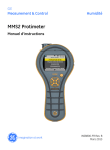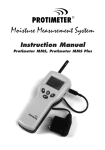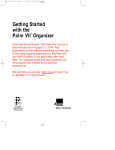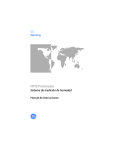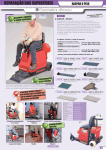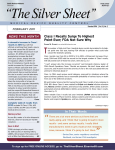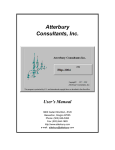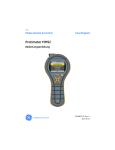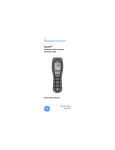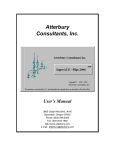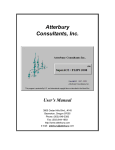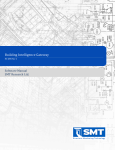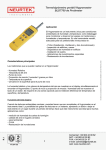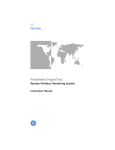Download Protimeter MMS2 - GE Measurement & Control
Transcript
GE Measurement & Control Moisture Protimeter MMS2 Instruction Manual INS8800 Rev. B March 2013 Protimeter MMS2 Moisture Measurement System Instruction Manual INS8800 Rev. B March 2013 [no content intended for this page] Contents 1. Introduction . . . . . . . . . . . . . . . . . . . . . . . . . . . . . . . . . . . . . . . . . . . . . . . 1 2. Safety Considerations. . . . . . . . . . . . . . . . . . . . . . . . . . . . . . . . . . . . . . . . 1 3. Product Components and Accessories . . . . . . . . . . . . . . . . . . . . . . . . . . . 2 3.1 Switching the MMS2 ON and OFF . . . . . . . . . . . . . . . . . . . . . . . . . . 4 4. MMS2 Modes. . . . . . . . . . . . . . . . . . . . . . . . . . . . . . . . . . . . . . . . . . . . . . 5 4.1 Pin Moisture Meter - Selection and Use . . . . . . . . . . . . . . . . . . . . . . 5 4.2 Pinless Moisture Meter — Selection and Use . . . . . . . . . . . . . . . . . . 8 4.3 Hygrometer - Selection and Use . . . . . . . . . . . . . . . . . . . . . . . . . . . 10 4.4 Psychrometrics - Selection and Use. . . . . . . . . . . . . . . . . . . . . . . . . 12 4.5 Condensator . . . . . . . . . . . . . . . . . . . . . . . . . . . . . . . . . . . . . . . . . . . 13 4.6 Logging - Selection and Use . . . . . . . . . . . . . . . . . . . . . . . . . . . . . . 15 4.7 Settings - Selection and Use . . . . . . . . . . . . . . . . . . . . . . . . . . . . . . 16 5. Diagnostic Procedure Guidelines . . . . . . . . . . . . . . . . . . . . . . . . . . . . . . 20 6. Calibration Checking . . . . . . . . . . . . . . . . . . . . . . . . . . . . . . . . . . . . . . . 22 7. Care and Maintenance . . . . . . . . . . . . . . . . . . . . . . . . . . . . . . . . . . . . . . 23 8. Displaying the MMS2 Information . . . . . . . . . . . . . . . . . . . . . . . . . . . . 24 9. Technical Specifications . . . . . . . . . . . . . . . . . . . . . . . . . . . . . . . . . . . . . 25 9.1 Operating Conditions . . . . . . . . . . . . . . . . . . . . . . . . . . . . . . . . . . . . 25 9.2 Measurement Specifications . . . . . . . . . . . . . . . . . . . . . . . . . . . . . . 25 9.3 Physical Specifications . . . . . . . . . . . . . . . . . . . . . . . . . . . . . . . . . . 27 9.4 Regulatory Compliance . . . . . . . . . . . . . . . . . . . . . . . . . . . . . . . . . . 27 9.5 User Interface. . . . . . . . . . . . . . . . . . . . . . . . . . . . . . . . . . . . . . . . . . 27 INS8800 Rev. B iii Contents iv INS8800 Rev. B Protimeter MMS2 Instruction Manual 1. Introduction The Protimeter Moisture Measurement System2 (Protimeter MMS2) is a powerful and versatile instrument for measuring and diagnosing dampness in buildings and building materials. This product enables building surveyors and other practitioners to measure moisture levels of building elements such as walls, floors and building environments simply by switching between the five different modes of operation. In this way, a detailed understanding of the moisture condition of the property can be obtained. 2. Safety Considerations • Caution note for the WME pins - The Pin Moisture measurement pins are extremely sharp and the instrument should be handled with due care. The pins should be covered with the cap provided with the unit when the function is not in use. • IR temperature measurement - Please note that the readings are indicative readings outside the measurement range of the IR temperature mode and the accuracy of the measurement is not guaranteed outside the range. • Calibration of unit - The accuracy specifications of the product are valid for one year after the date of calibration, and the product requires recalibration after this period. Laser pointers are effective tools when used properly, but the following considerations must be observed when using laser pointers: • • • • Never look directly into the laser beam. Never point a laser beam at a person. Do not aim the laser beam at reflective surfaces. Never view a laser beam using an optical instrument, such as binoculars or a microscope. INS8800 Rev. B 1 Protimeter MMS2 Instruction Manual 2. Safety Considerations (cont.) • Do not allow children to use laser pointers unless under the supervision of an adult. • Use only laser pointers meeting the following criteria: 3. • Labeled with FDA certification stating “DANGER: Laser Radiation” for Class 3R lasers or “CAUTION: Laser Radiation” for Class 2 lasers. • Classified as Class 2 or 3R according to the label. Do not use Class 3b or Class 4 products. • • Operates at a wavelength between 630 nm and 680 nm. Has a maximum output less than 5 mW, the lower the better. Product Components and Accessories The MMS2 instrument measures the different parameters in the buildings: room temperature, room humidity, building material moisture, surface moisture and surface temperature (contact and non-contact method). To measure all the above mentioned parameters, MMS2 uses different sensors, along with a variety of accessories for convenient measurements. The following external connections are found on the instrument (see Figure 1 on page 3): A - This edge connection socket is for use with a Hygrostick® Quikstick or Short Quikstick probe. B - This jack connection socket is for use with a moisture probe, deep wall probes or a Hammer electrode. C - This jack connection socket is for use with the Direct Contact Surface Temperature Sensor. 2 INS8800 Rev. B Protimeter MMS2 Instruction Manual 3. Product Components and Accessories (cont.) D - This USB socket is for connection to a PC when using the optional MMS2 logging software. C B A Search Mode Sensor D Laser Non-contact Surface Temperature Sensor (IR) Figure 1: Connections for Probes and Sensors • The Hygrostick (POL4750), Quikstick (POL8750) and Short Quikstick (POL8751) probes measure relative humidity (%RH) and ambient air temperature in rooms or materials. They can be connected to the MMS2 instrument either directly or by means of the extension lead. • The surface temperature sensor is used when investigating condensation situations. • The moisture probe is used to obtain percent moisture content values in wood or wood moisture equivalent (WME) values in other nonconductive materials. • Multiple probe types are available, including hammer probes and deep wall probes. INS8800 Rev. B 3 Protimeter MMS2 Instruction Manual 3.1 Switching the MMS2 ON and OFF Prior to initial use, ensure that a 9V battery is correctly inserted in the battery compartment. Note: The battery status is indicated by an icon on the display. When the LOW BATTERY message appears, replace the battery. To switch the MMS2 ON, press the power button Note: momentarily. The MMS2 switches OFF automatically after 2 minutes if no activity is observed, unless the default settings are changed (see Section 4.7c, “Auto Off”, on page 17 for instructions). To switch the instrument OFF immediately, press 3 seconds. Once and hold for at least has been depressed for 3 seconds or more, the text string SWITCHING OFF THE DEVICE appears on the display. When text string disappears and the unit switches OFF. is released, the Whenever the battery voltage falls below the threshold value, the LOW BATTERY message appears. If the battery voltage falls below the operating level, the instrument prompts with the message: LOW BATTERY SWITCHING OFF THE DEVICE 4 INS8800 Rev. B Protimeter MMS2 Instruction Manual 4. MMS2 Modes The Protimeter MMS2 can be used to detect and measure moisture in non-conductive solid materials such as wood, drywall and masonry. The MMS2 can measure the different parameters in building applications: room temperature, room relative humidity, surface temperature with contact and non-contact method, qualitative measurements and precise and localized moisture content measurements in wood or WME values in materials other than wood. 4.1 Pin Moisture Meter - Selection and Use Navigate to SELECT MODE -> PIN MOISTURE METER and press to select the Pin Moisture Meter mode. Connect the moisture probe, deep wall probe, or Hammer electrode into socket B of the MMS2 instrument. The instrument can now be used to take actual %MC (moisture content) readings in wood and %WME readings in non-conductive solid materials other than wood by placing the moisture probe pins in firm contact with the surface as shown in Figure 2 on page 6. The measured value is displayed and the progress bar indicates whether the material is in a DRY, AT RISK or WET condition. Table 1: MC Readings and Progress Indicators MC%WME Display Indication Progress Bar <7.8 ---.- >7.8 but <17 MC%WME value DRY Green >17 but <20 MC%WME value RISK Yellow >20 MC%WME value WET Red Note: The MMS2 has the capability to show %MC value for 8 wood types. INS8800 Rev. B 5 Protimeter MMS2 Instruction Manual 4.1 Pin Moisture Meter - Selection and Use (cont.) When the instrument is in Pin Moisture Meter mode, by default it displays WME WOODTYPE A (see the Protimeter wood calibration chart). Use the up and down buttons / to navigate between different wood types. From Wood Type B to Wood Type H, if MC% is greater than 30.0, ABOVE FIBER SAT will be displayed as the wood status, otherwise the wood status will not be displayed. When using the built-in pins, the operator should make firm contact on the surface. It is not necessary or recommended to push the pins deeply below the surface. Figure 2: Using the Pin Moisture Meter 6 INS8800 Rev. B Protimeter MMS2 Instruction Manual 4.1a Using Auxiliary Deep Well Moisture Probes in Measure Mode To take sub-surface readings in masonry, the deep wall probes should be used instead of the standard moisture probe. To use the deep wall probes, drill two 1/4” (6 mm) diameter clearance holes, spaced 2-3 in. (50-75 mm) apart, to the required depth. Push the two deep wall probes into the holes and press and hold the tips firmly against the bottom of the holes. Ensure that the probes are connected to socket B and measure the %WME value as described in Section 4.1, “Pin Moisture Meter - Selection and Use”, on page 5. Note: The most convenient way to take sub-surface readings in wood is by using an optional Hammer Electrode. 4.1b Detecting Hygroscopic Salts The Protimeter MMS2 instrument can be used as a basic salts detector when used with the moisture probe, filter papers and distilled water (not included). Moisten the filter paper with the water and take a reference reading across it with the moisture probe. Then place the moistened filter paper against the surface of interest and hold in place for 30 seconds. Remove the paper and place the pins of the moisture probe across the paper again and observe the reading. Compare this reading with the original reference reading. If the difference is more than 20 points, there is significant salts contamination that may warrant further investigation. INS8800 Rev. B 7 Protimeter MMS2 Instruction Manual 4.2 Pinless Moisture Meter — Selection and Use Navigate to SELECT MODE -> PINLESS MOISTURE METER and press select the Pinless Moisture Meter mode. to The instrument can be used to take relative moisture readings in solid, homogenous materials (such as walls and floors) by holding the surface of the sensor bulge against the surface (see Figure 3 below). Relative readings ranging from 60-999 appear on the LCD together with a progress bar that indicates whether the material is in a DRY, AT RISK or WET condition. Note: When holding the meter at the bottom, away from any objects, it should not show any reading. Figure 3: Taking Relative Moisture Readings 8 INS8800 Rev. B Protimeter MMS2 Instruction Manual 4.2 Pinless Moisture Meter — Selection and Use (cont.) As reliable readings are obtained only if the sensor bulge is in direct contact with the surface, the Search mode is not suitable for surveying textured finishes. The nominal depth of penetration is up to17 mm (3/4”) in dense, homogeneous materials. Readings taken through low-density coverings (carpets, polystyrene tiles, etc.) will not be representative of the moisture level in the substrate itself. When using the MMS2 in Pinless mode, it is recommended that no attachments are connected. This practice will minimize reading errors and the potential for electromagnetic interference with other electronic equipment. When the Pinless Moisture Meter mode is selected, the device will display the surface moisture in terms of Wood Moisture Equivalent count. Note: Place the MMS2 on the surface, but do not slide it. Sliding will wear out the back of the meter, as well as possibly mark the wall. Aquant Table 2: Aquant Indicators Display Indication <60 ---- >60 but <170 Aquant value DRY Green >170 but <200 Aquant value RISK Yellow >200 but <999 Aquant value WET Red >999 999 WET Red INS8800 Rev. B Progress Bar 9 Protimeter MMS2 Instruction Manual 4.2 Pinless Moisture Meter — Selection and Use (cont.) In Search mode, the device has the capability to give comparative measurement. Note: If metal is present below the surface, the MMS2 may give a false positive. Comparative measurement helps in measuring whether the surface moisture/material is wetter or dryer than the Reference surface/ material. If the surface moisture/material is wetter than the reference surface/ material, then the progress bar is red, or if it’s dryer, then the progress bar is green. This method takes four steps: 1. Select Pinless Moisture meter under the Main Menu. 2. Place the device on the material which has been chosen as the reference material. 3. Press the right arrow button reference reading. for two seconds to store the reading as 4. Now if the device is placed on any material, it indicates whether the material is wetter or dryer than the reference material. 4.3 Hygrometer - Selection and Use Navigate to SELECT MODE -> HYGROMETER and press Hygrometer mode. to select the To use the Protimeter MMS2 as a Hygrometer (see Figure 4 on page 11), connect the Hygrostick, Quikstick or Short Quikstick probe into socket A either directly or indirectly with the extension lead. 10 INS8800 Rev. B Protimeter MMS2 Instruction Manual 4.3 Hygrometer - Selection and Use (cont.) Relative humidity and temperature measurements are made with the Hygrostick, Quikstick or Short Quikstick probe, and the MMS2 instrument uses these values to calculate a range of psychometric readings. When using the MMS2 to measure the conditions in air, the humidity probe is normally connected directly to the instrument. However, when it is impractical or awkward to use the instrument in this way, the extension lead may be used to connect the Hygrostick, Quikstick or Short Quikstick to the instrument. Typically, the extension lead will be used when taking readings from probes that have been embedded in structures such as walls and floors. Figure 4: MMS2 as a Hygrometer Note: For best response time, do not store the MMS2 in excessively hot or cold locations, such as in a vehicle. INS8800 Rev. B 11 Protimeter MMS2 Instruction Manual 4.4 Psychrometrics - Selection and Use Navigate to SELECT MODE -> PSYCHROMETRICS and press Psychrometrics mode. to select the Connect the Hygrostick, Quikstick or Short Quikstick probe into socket A. The following parameters are displayed in this mode: 4.4a Dew Point Navigate to SELECT MODE -> PSYCHROMETRICS -> DEW POINT and press to get the Dew Point reading. 4.4b Grains per Pound/Grams per Kilogram Navigate to SELECT MODE -> PSYCHROMETRICS -> GRAMS PER KILOGRAM/ GRAINS PER POUND and press to get the Absolute Humidity reading. 4.4c Enthalpy Navigate to SELECT MODE -> PSYCHROMETRICS -> ENTHALPY and press get the Enthalpy reading. to 4.4d Vapor Pressure Navigate to SELECT MODE -> PSYCHROMETRICS -> VAPOR PRESSURE and press to get the Vapor Pressure reading. Note: 12 Change the units in Settings (see page 16) to obtain both metric and non-metric equivalents. INS8800 Rev. B Protimeter MMS2 Instruction Manual 4.5 Condensator The Condensator Mode enables the user to assess the risk of condensation occurring on surfaces or to confirm whether or not condensation is present on a surface. The MMS2 can be used as a Condensator using two modes: 4.5a Surface Temperature Probe (Contact Based) - Selection and Use Navigate to SELECT MODE -> SURFACE TEMPERATURE PROBE and press select the Surface Temperature Probe mode. to In this mode, the MMS2 measures the surface temperature using an external Surface Temperature probe inserted into socket C and making contact with the surface to be assessed. In addition to the Surface Temperature probe, connect a Humidity probe into socket A for the MMS2 to show the Condensation status. TDIFF is a useful function when investigating condensation, as it tells the user how many degrees a surface temperature is above or below the prevailing dew point temperature. 4.5b Surface Temperature IR (Non-Contact Based) - Selection and Use In this mode, the MMS2 measures surface temperature using IR technology Connect a humidity probe into socket A. Hold the button to enable the IR Thermometer. Release the button and press it again within 1 second to enable the LASER pointer. The LASER pointer will indicate the area on the surface where the measurement is being taken (see Figure 5 on page 14). INS8800 Rev. B 13 Protimeter MMS2 Instruction Manual 4.5b Surface Temperature IR (Non-Contact Based) - Selection and Use (cont.) Figure 5: LASER Pointer 14 T. DIFF (DEGC) Table 3: TDIFF Readings Condensation Status Progress Bar <0 Condensation >0 but <3 Risk of Condensation Yellow >3 No Condensation Green Red INS8800 Rev. B Protimeter MMS2 Instruction Manual 4.6 Logging - Selection and Use The MMS2 supports both continuous and manual logging. 4.6a Manual Logging If is pressed at any of the measurement screens, the data and Timestamp at that instant will be logged and a RECORD SAVED message will be displayed on the bottom bar. 4.6b Continuous Logging Continuous logging is used to sample and store data continuously. Continuous logging is enabled either by setting logging parameters through the Keypad or through a PC using MMS2 Logging Software. (see Section 4.7g, “Set Logging Parameters (Optional PC Logging Software Required)”, on page 19.) After the logging parameters are saved, logging starts after the START AFTER minutes have elapsed. The logging icon is displayed on the top right corner of the screen while logging is active. When logging is in progress, an option to stop logging is provided under the SETTINGS menu. Logging can be stopped either by selecting SELECT MODE -> SETTINGS -> STOP LOGGING in the instrument, by clicking STOP LOGGING in the MMS2 Logging Software or when the instrument is turned OFF. INS8800 Rev. B 15 Protimeter MMS2 Instruction Manual 4.7 Settings - Selection and Use The Protimeter MMS2 instrument has a range of user-selectable features. to configure the Navigate to SELECT MODE -> SETTINGS and press MMS2. The following options are available for configuring: 4.7a Set Units MMS2 has the option to select between METRIC and NON METRIC units. Navigate to SELECT MODE -> SETTINGS -> UNITS and press Unit options. Use press / to open the to navigate between the options available, and to save the desired units. Table 4 below shows how the units and the parameters measured appear in metric and non-metric units. Table 4: Metric and Non-Metric Units for Parameters Metric Non-Metric Temperature °C °F Dew Point °C °F Absolute Humidity g/kg g/lb Enthalpy kJ/kg BTU/lb Vapor Pressure kPa inHg Surface Temperature °C °F T. Diff °C °F Ambient Dew Point °C °F 16 INS8800 Rev. B Protimeter MMS2 Instruction Manual 4.7b Date and Time Navigate to SELECT MODE -> SETTINGS -> DATE AND TIME and press change the date and time. Use / to to navigate to the required field. Then, use to increment/decrement the value in that box. After entering the required date and time, press to set the date and time. The new date and time are displayed at the top right corner of the screen. Date and time can also be set up by connecting to a PC and using the optional MMS2 logging software. 4.7c Auto Off The MMS2 will switch OFF automatically after auto switch off time, if no activity/key press is observed. Navigate to SELECT MODE -> SETTINGS -> AUTO OFF and press to configure the Auto off time. Use / to navigate between 0 to 6 minutes and press to set the Auto off time. To disable the Auto off feature, set the Auto switch off time to 0. Note: During continuous logging operation, auto switch off time is considered to be the display turnoff time. 4.7d Set Brightness Navigate to SELECT MODE -> SETTINGS -> SET BRIGHTNESS and press set the Brightness level. Use / to to navigate between the different brightness levels (1 to 10) and press to set the desired brightness. (Brightness level 2 is the default setting.) INS8800 Rev. B 17 Protimeter MMS2 Instruction Manual 4.7e Buzzer On-Off This option is used to switch the Buzzer ON/OFF. When the Buzzer is ON: • • • Any key press will make a beep sound. In WME/Aquant mode, a RISK/WET condition will be alerted. Instrument turn ON/OFF will be indicated Navigate to SELECT MODE -> SETTINGS -> BUZZER ON-OFF and press switch the Buzzer on/off. Use / to navigate between the on and off options and press save the desired configuration. 4.7f to to Calibration The Calibration option is unavailable to the user. 18 INS8800 Rev. B Protimeter MMS2 Instruction Manual 4.7g Set Logging Parameters (Optional PC Logging Software Required) Navigate to SELECT MODE -> SETTINGS -> SET LOGGING and press the following logging parameters: • • • to set Start After: minutes after which logging should start (0 to 999). Sampling Interval: sampling interval in minutes (1 to 60). End After: minutes after which logging should stop after sampling begins (1 to 999). • Job Number: 1 to 255 Use to navigate to the required box. Then, use or decrement the value in that box and press parameters. Note: / to increment to save the entered logging You can also set up and conduct logging via the optional PC software. INS8800 Rev. B 19 Protimeter MMS2 Instruction Manual 5. Diagnostic Procedure Guidelines When diagnosing dampness in buildings, three key criteria must be considered, as outlined in Table 5 below. Item 20 Table 5: Diagnostic Criteria Criteria Notes 1 Is a wall or other building element in a safe air-dry condition? Air-dry is the moisture content that is normal and safe (from moisture-related deterioration or decay) in buildings. When the Protimeter MMS2 moisture meter modes are selected, measured values are identified as DRY, AT RISK or WET. 2 Is the surface temperature of a wall or other building element above or below the dew point? Dew point is the temperature at which a given quantity of air becomes saturated (100% RH) and forms dew, or condensation. If a surface is colder than the dew point, condensation occurs. When the Protimeter MMS2 Condensator Mode is selected to measure TDIFF (the proximity of a surface to the dew point) the instrument identifies either a NO CONDENSATION condition, an AT RISK condition, or a CONDENSATION occurring condition. 3 Is a wall surface or other building element contaminated with hygroscopic salts or other conductive material? Artificially high moisture meter readings may be obtained either in material that has been heavily contaminated by hygroscopic salts or in materials that are conductive by nature. The presence or absence of nitrates and chlorides should be established when investigating suspected rising dampness situations in particular. INS8800 Rev. B Protimeter MMS2 Instruction Manual 5. Diagnostic Procedure Guidelines (cont.) Item 1: The Search and Measure modes (pinless and pin) should be used in combination to map out the extent of a moisture problem and to distinguish between surface and sub-surface moisture. The profile of readings obtained will give insight into the potential cause (e.g., condensation, lateral ingress or rising dampness) of a moisture-related problem. Far greater insight will be obtained from moisture readings taken in a methodical manner than from those taken in a random manner. When testing walls, the user should start by taking readings at the lower levels and move up the wall in regular steps of 4-6 in. (10-15 cm). When high subsurface relative readings are obtained in the Search mode, the user is strongly recommended to quantify these values in %WME terms by using the deep wall probes in the Measure mode. If the depth of clearance holes is increased incrementally by a nominal 0.4 in. (10 mm) at a time, the moisture profile through the wall can be established. Item 2: Condensation related moisture problems are common. When assessing the risk of condensation, or confirming its existence, the proximity of the actual temperature of the surface under investigation to the dew point must be established. The TDIFF measurement in CONDENSATOR mode tells the user how many degrees the temperature of a surface is above or below the dew point. As many condensation situations are transient, TDIFF readings should be taken in a methodical and regular manner, similar to moisture meter readings in materials. Ambient RH and temperature values should also be taken to assess the moisture condition of the room as a whole. Dwellings and working environments generally have an RH from 40% to 60%, so there may be cause to investigate environments that register RH values outside this range. INS8800 Rev. B 21 Protimeter MMS2 Instruction Manual 5. Diagnostic Procedure Guidelines (cont.) Item 3: Two hygroscopic salts, chlorides and nitrates, may build up on the surface of walls where rising dampness or wicking occurs. As groundwater moves through the wall and migrates to the surface, salts tend to accumulate where the rate of evaporation of this water is greatest. The salts themselves are non-conductive, but when mixed with a small amount of moisture a highly conductive solution is formed. The presence (or absence) of such salts should therefore be established when rising dampness is suspected by using the Protimeter MMS2 in Measure mode as described. When required, the Protimeter Salts Analysis Kit (part number BLD4900) can be used to identify the relative concentrations of nitrates and chlorides. In summary, effective dampness diagnosis is a process that draws on the knowledge and expertise of the surveyor. The Protimeter MMS2 kit enables the user to investigate moisture levels in materials and environments from various perspectives that, in turn, permits a more thorough and reliable judgment as to the cause of dampness related problems. 6. Calibration Checking Check the moisture meter Measure Mode by holding the pins of the moisture probe across the exposed wires of the calibration check device (Calcheck). The WME value of correctly calibrated instruments is 17-19. Instruments that register values outside this range should be returned to GE Measurement & Control (or an authorized GE distributor) for servicing. Note: Search mode can be checked against a stable area of wall. For comparative purposes, humidity and ambient temperature conditions should be stable and consistent. Working Hygrostick, Quikstick and Short Quikstick probes can be checked against reference probes and/or over standard salt solutions. 22 INS8800 Rev. B Protimeter MMS2 Instruction Manual 7. Care and Maintenance The Protimeter MMS2 is a precision-built electronic instrument that will provide many years of reliable service if the following points are observed: • When not in use, keep the MMS2 instrument and its accessories in the factory carry case. Store the case in a stable, dust-free environment and keep it out of direct sunlight. • If the instrument is to be stored for more than four weeks or if the low battery power symbol appears on the display, remove the batteries from the instrument. • When using the MMS2 in Search mode, do not slide the bulge across surfaces, as this may lead to rapid instrument case wear. The instrument should be lifted and placed in position to prevent such wear. • Check the condition of the MMS2 accessories on a regular basis, and replace them if they become worn or damaged. • To preserve their calibration characteristics, Hygrostick probes should not be exposed to saturated environments. If this is unavoidable, Hygrostick probes should be replaced on a regular basis and their calibration should be checked frequently. INS8800 Rev. B 23 Protimeter MMS2 Instruction Manual 8. Displaying the MMS2 Information Go to SELECT MODE -> VERSION to view the MMS2 information. The following information will be provided: • • • • Firmware version • Battery status 24 Date of build Device Model and Serial number Calibration date/status: Tair-RH-WME-Ts, Aquant, IR, surface temperature INS8800 Rev. B Protimeter MMS2 Instruction Manual 9. Technical Specifications 9.1 Operating Conditions Operating Temperature Range Instrument Only: 0°C - 50°C Humidity: 0 to 95% non-condensing 9.2 Measurement Specifications 9.2a Humidity Measurement Hygrostick Data (Nominal) Relative Humidity Range: 30% to 40% RH, Range: 41% to 98% RH, Accuracy: ±3% RH at 68°F (20°C) Accuracy: ±2% RH at 68°F (20°C) Temperature Range: 14°F to 122°F (-10°C to 50°C), Accuracy: ±0.6°F (±0.3°C) Short Quikstick Data (Nominal) Relative Humidity Range: 0% to 10% RH, Range: 10% to 90% RH, Range: 90% to 100% RH, Accuracy: ±3% RH at 68°F (20°C) Accuracy: ±2% RH at 68°F (20°C) Accuracy: ±3% RH at 68°F (20°C) Temperature Range Range: 14°F to 122°F (-10°C to 50°C), INS8800 Rev. B Accuracy: ±0.6°F (±0.3°C) 25 Protimeter MMS2 Instruction Manual 9.2b Moisture Measurement For Integrated and Remote Pin probes Integrated pins Strong and reliable integrated WME pins with cap, No effect on readings by surface moisture Pin (% WME) 8% to 100%, readings over 30% are relative Non-invasive (RF) Up to 3/4” (15 mm) deep, 60 to 999 (relative), Tolerance: ±10 relative scale 9.2c Surface Temperature Thermistor Based Remote Non-Integrated Probe Range: -4°F to 176°F (-20°C to +80°C) Accuracy: ±2.7°F (±1.5°C) IR Based — With 12:1 (D:S) Ratio — With Laser Pointer Range: 14°F to 122°F (-10°C to 50°C) Accuracy: ±3.6°F (±2°C) @77°F (25°C) 26 INS8800 Rev. B Protimeter MMS2 Instruction Manual 9.3 Physical Specifications 9.3a Power Battery 9V Alkaline 550mAH Battery Life visual indication on LCD 9.3b Size (H x W x D) 7.5 in. x 3.7 in. x 2.2 in. (19.1 cm x 9.4 cm x 5.6 cm) 9.3c Gross Weight Instrument only: 9.17 oz (260 g) 9.3d Maximum Needle Depth For WME Pins 0.4 in. (10 mm) 9.3e Buzzer Audible buzzer for Key tone, WME/Aquant Measurement 9.4 Regulatory Compliance CE, RoHS, ETL 9.5 User Interface 9.5a Keypad Plastic/silicone keypad for easy navigation between different user menus on the unit, separate key for IR operation (non-contact based surface measurement) INS8800 Rev. B 27 Protimeter MMS2 Instruction Manual 9.5b Display Graphical LCD Size: 2.4”¨ Color: 256 bits Resolution: 320 x 240 dpi Backlight (with adjustable brightness) 9.5c Language Multiple language support 9.5d User Application Profiles Sticky memory last used application settings 9.5e PC Interface USB interface: mini B type USB port on instrument PC Interface features: Firmware Upgrade in field User specific instrument setup Data Logging setup Stored data retrieval 9.5f Data Logging RH-Tair-Ts-WME-Aquant Data logging Easy user setup through Keypad Samples with Date and Time stamp: Manual logging — 8000 samples Continuous logging — 6100 samples 28 INS8800 Rev. B Customer Support Centers U.S.A. The Boston Center 1100 Technology Park Drive Billerica, MA 01821 U.S.A. Tel: 800 833 9438 (toll-free) 978 437 1000 E-mail: [email protected] Ireland Sensing House Shannon Free Zone East Shannon, County Clare Ireland Tel: +44 1823 335 200 E-mail: [email protected] www.ge-mcs.com ©2013 General Electric Company. All rights reserved. Technical content subject to change without notice. INS8800 Rev. B




































